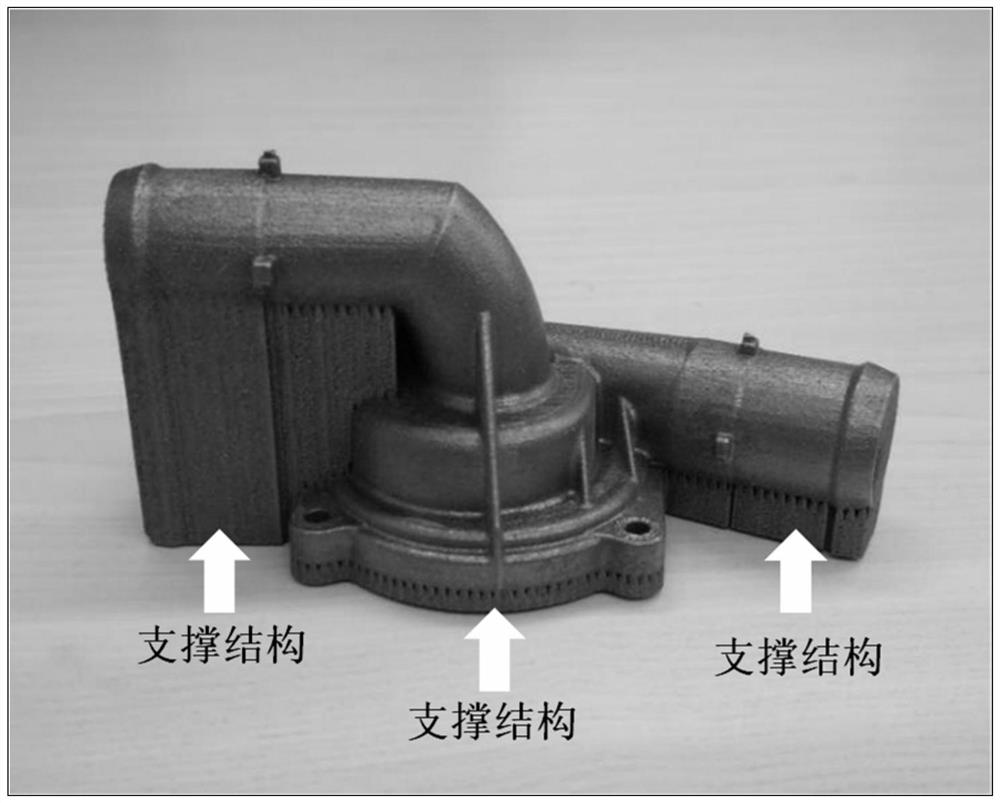A method for removing support structures in additively manufactured titanium alloys
A support structure and additive manufacturing technology, which is applied in the directions of additive manufacturing, additive processing, and process efficiency improvement, can solve the problems of easy addition and removal of support structures, etc. Effect
- Summary
- Abstract
- Description
- Claims
- Application Information
AI Technical Summary
Problems solved by technology
Method used
Image
Examples
Embodiment 1
[0036] In the present embodiment, the method for removing the support structure of TC4 titanium alloy additive manufacturing technology includes the following steps:
[0037] (1) Use an explosion-proof vacuum cleaner, a mechanical vibrating table and high-pressure gas to clean the internal structure of the molded part, and remove the residual powder and other redundant parts;
[0038] (2) Perform vacuum heat treatment at 600°C / 2h on the cleaned molded parts, and cool to room temperature in the furnace;
[0039] (3) Use hydrofluoric acid, nitric acid and water with a volume ratio of 1 / 3 / 1 to treat the surface of the molded part, remove surface sticky powder, and reduce the surface roughness of the molded part. The treatment method is soaking; wherein, hydrogen The concentration of hydrofluoric acid is 35wt%, and the concentration of nitric acid is 66wt%;
[0040] (4) adopt hydrofluoric acid, nitric acid and the solution that water volume ratio is 1 / 2 / 9 to process support struc...
Embodiment 2
[0046] In the present embodiment, the method for removing the support structure of TC6 titanium alloy additive manufacturing technology includes the following steps:
[0047] (1) Use an explosion-proof vacuum cleaner, a mechanical vibrating table and high-pressure gas to clean the internal structure of the molded part, and remove the residual powder and other redundant parts;
[0048] (2) Perform vacuum heat treatment at 800°C / 1h on the cleaned molded parts, and cool the furnace to room temperature;
[0049] (3) Using hydrofluoric acid, nitric acid and a solution with a volume ratio of 1 / 5 / 3 to treat the surface of the molded part, remove surface sticky powder, and reduce the surface roughness of the molded part. The treatment method is soaking; wherein, hydrogen The concentration of hydrofluoric acid is 36wt%, and the concentration of nitric acid is 65wt%;
[0050] (4) adopt hydrofluoric acid, nitric acid and the solution that water volume ratio is 1 / 3 / 7 to process support s...
Embodiment 3
[0056] In this embodiment, the method for removing the support structure of TC11 titanium alloy additive manufacturing technology includes the following steps:
[0057] (1) Use an explosion-proof vacuum cleaner, a mechanical vibrating table and high-pressure gas to clean the internal structure of the molded part, and remove the residual powder and other redundant parts;
[0058] (2) Perform vacuum heat treatment at 800°C / 0.5h on the cleaned molded parts, and cool to room temperature in the furnace;
[0059] (3) Using hydrofluoric acid, nitric acid and a solution with a volume ratio of 1 / 4 / 1 to treat the surface of the molded piece, remove surface sticky powder, and reduce the surface roughness of the molded piece. The treatment method is soaking; wherein, hydrogen The concentration of hydrofluoric acid is 37wt%, and the concentration of nitric acid is 67wt%;
[0060] (4) The support structure is treated with hydrofluoric acid, nitric acid and water with a volume ratio of 1 / 2 / ...
PUM
 Login to View More
Login to View More Abstract
Description
Claims
Application Information
 Login to View More
Login to View More - R&D
- Intellectual Property
- Life Sciences
- Materials
- Tech Scout
- Unparalleled Data Quality
- Higher Quality Content
- 60% Fewer Hallucinations
Browse by: Latest US Patents, China's latest patents, Technical Efficacy Thesaurus, Application Domain, Technology Topic, Popular Technical Reports.
© 2025 PatSnap. All rights reserved.Legal|Privacy policy|Modern Slavery Act Transparency Statement|Sitemap|About US| Contact US: help@patsnap.com

